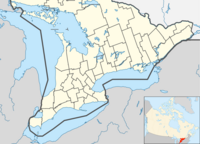Nelson, Ontario
| Burlington | |||
|---|---|---|---|
| City (lower-tier) | |||
| City of Burlington | |||

Spencer Smith Park on Burlington's waterfront
|
|||
|
|||
| Motto: Stand By | |||
| Coordinates: 43°19′N 79°48′W / 43.317°N 79.800°WCoordinates: 43°19′N 79°48′W / 43.317°N 79.800°W | |||
| Country |
|
||
| Province |
|
||
| Region | Halton | ||
| Established | 1874 | ||
| City status | 1974 | ||
| Government | |||
| • Mayor | Rick Goldring | ||
| • Governing Body | Burlington City Council | ||
| • MPs | Karina Gould (Lib), Pam Damoff (Lib), Lisa Raitt (CPC) | ||
| • MPPs | Eleanor McMahon (OLP), Indira Naidoo-Harris (OLP) | ||
| Area | |||
| • Total | 185.66 km2 (71.68 sq mi) | ||
| Elevation | 74 m (243 ft) | ||
| Population (2016) | |||
| • Total | 183,314 (Ranked 28th) | ||
| • Density | 946.8/km2 (2,452/sq mi) | ||
| Demonym(s) | Burlingtonian, Burlingtonite | ||
| Time zone | Eastern (UTC−5) | ||
| • Summer (DST) | EDT (UTC−4) | ||
| Forward sortation area | L7L to L7T | ||
| Area code(s) | 905, 289, 365 | ||
| Highways |
Former |
||
| Website | www.burlington.ca | ||
Burlington (Canada 2016 Census population 183,314) is a city in the Regional Municipality of Halton at the northwestern end of Lake Ontario. Along with Milton to the north, Burlington forms the west end of the Greater Toronto Area, while its metropolitan census area is part of the neighbouring city of Hamilton. Burlington lies between Lake Ontario's north shore and the Niagara Escarpment. Economically, Burlington is strategically located near the geographic centre of the Golden Horseshoe, a densely populated and industrialized region of over 8 million people.
In 2016, MoneySense rated Burlington as the ninth best place to live in Canada.
Before pioneer settlement in the 19th century, the area was covered by the primeval forest that stretched between the provincial capital of York and the town of Hamilton, and was home to various First Nations peoples. In 1792, John Graves Simcoe, the first lieutenant governor of Upper Canada, named the western end of Lake Ontario "Burlington Bay" after the town of Bridlington in the East Riding of Yorkshire, England. By the time land beside the bay was deeded to Captain Joseph Brant at the turn of the 19th century, the name "Burlington" was already in common use. With the completion of the local survey after the War of 1812, the land was opened for settlement. Early farmers prospered in the Burlington area because of the fertile soil and moderate temperatures. Produce from the farms was shipped out via the bustling docks of the lakeside villages of Port Nelson and Wellington Square, as well as Brown's Wharf in the nearby village of Port Flamborough (which was to become Aldershot). Lumber taken from the surrounding forests also competed for space on the busy docks. However, in the latter half of the 19th century, increased wheat production from Western Canada convinced local farmers to switch to fruit and vegetable production.
...
Wikipedia


